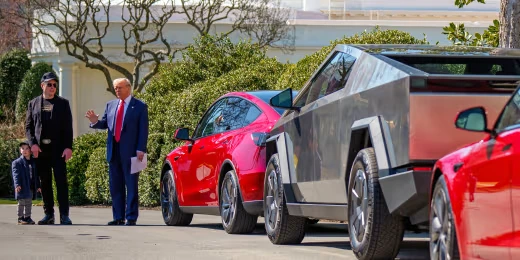Tesla’s Financial Downturn Deepens Despite Musk’s Exit from White House
By Edwin V. Christopher

Tesla Inc. posted a sharp decline in financial performance for the second quarter of 2025, as revenue fell roughly 12%, its steepest drop in at least a decade, and net profits dropped approximately 16%—a reflection of weakening demand, reduced EV policy support, growing competition, and fallout from CEO Elon Musk’s controversial involvement in the Trump administration. The company disclosed revenue of approximately $22.5 billion and net income of around $1.17 billion, compared with $25.5 billion and $1.4 billion a year prior, with vehicle deliveries plunging 13.5% year-over-year to 384,122 units :. Among drivers of the downturn is the elimination of the U.S. $7,500 EV tax credit under President Trump’s new fiscal plan, which analysts say could reduce Tesla’s sales by 10–12%, and expected to phase out fully by September 2025 :.Musk, who served briefly in federal government earlier in 2025, has now exited his political role amid intensifying consumer backlash and corporate trauma. Observers say his advisory stint, combined with public disputes with Trump, triggered widespread protests, boycotts, and social media backlash—including the “Tesla Takedown” activist campaigns targeting the company’s reputation in markets across Europe and North America :. Executives attributed some performance pressure to “a sustained uncertain macroeconomic environment” marked by shifting tariffs and weakened consumer sentiment tied to Musk’s political alignment and resulting brand erosion :.On earnings calls, Musk warned investors that Tesla may experience “a few rough quarters” in the near term—possibly through Q4 2025 and into early 2026—but indicated confidence that autonomous driving services, robotaxis, and a planned low-cost vehicle could restore economic momentum by late next year :. Chief Financial Officer Vaibhav Taneja detailed that new tariffs added approximately $300 million in expenses during Q2 and highlighted ongoing pressure from lost regulatory credit revenue, which dropped nearly 50% year over year—from around $890 million to approximately $439 million—after automaker penalties ended under the new tax law :.Tesla continues to face growing competition in domestic and international markets, especially from Chinese automakers and established Western brands ramping up EV production. In Europe, Tesla deliveries declined by 40% in June alone and its market share across the region dropped from 1.3% to 0.7% year-over-year, adding to investor unease over declining demand and outdated product cycles :.The company is responding by accelerating production plans for a new, more affordable version of its Model 3/Y in late 2025, and by preparing to launch its Tesla robotaxi service, including the Cybercab and Semi trucks, by 2026. Musk emphasized that autonomy at scale could reset Tesla’s economics dramatically once regulatory approvals roll out in key states like California, Nevada, and Arizona :.Some investors, including veteran Tesla backer Ross Gerber, have voiced deep concern over the company’s trajectory, citing “sad and depressing” fundamentals and calling for Musk to refocus attention on stabilization rather than politics. Analysts from JPMorgan lowered price targets to around $115, while Barclays and William Blair urged caution, though others like Wedbush remain optimistic if robotaxi and low‑cost vehicle rollouts align with expectations :.Despite the bleak figures, Tesla still maintains substantial AI and robotics investments and asserts it has a strong balance sheet. Musk’s return to full-time focus—he has reportedly resumed sleeping in the office and working seven-day weeks—reflects his intent to steer the company through its current turbulence and signal operational commitment to investors :.Overall, Tesla’s latest results underscore a pivotal turning point: the company is navigating shrinking consumer demand, policy headwinds, inflated tariffs, reputational fallout from Musk’s political entanglements, and an aging product portfolio. The path forward hinges on timely execution of new product strategies, autonomous mobility rollouts, and regaining brand trust in a polarized political and competitive environment. Whether Tesla can rebound in the near term — or remains mired in financial downturn — remains a key question as it enters what many view as a critical transitional phase.